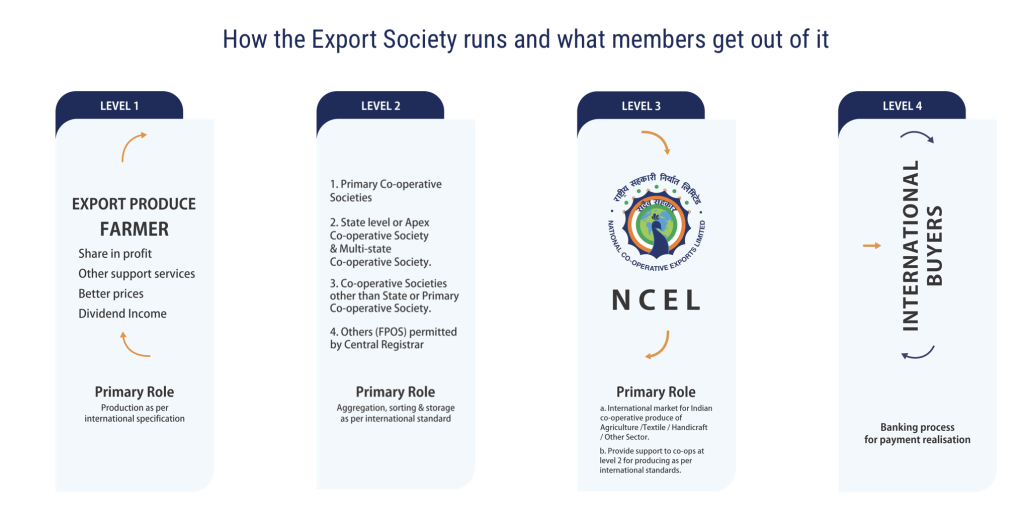
India’s cooperative sector is making significant strides in the global market, led by the rapid expansion and success of the National Cooperative Exports Limited (NCEL). In a short period, NCEL has grown its membership to 7,500 and achieved exports worth an impressive Rs 2,000 crore. This achievement underscores the potential of the cooperative sector to drive economic growth and promote the global reach of Indian agricultural products.
Key Developments and Achievements
The Ministry of Cooperation recently highlighted NCEL’s success on social media, emphasizing the organization’s growing influence in international trade. On May 8, 2024, the Ministry of Commerce & Industry issued a crucial notification permitting the export of 14,000 Metric Tons (MT) of Non-Basmati White Rice to Mauritius through NCEL. This move aligns with the Foreign Trade Policy of 2023 and marks a significant milestone in NCEL’s export journey.
Building on this momentum, NCEL is set to export 1,600 tons of white rice to Singapore. This achievement is the result of successful negotiations with Singapore’s aggregator, demonstrating NCEL’s ability to overcome challenges such as customs duties and to expand its international footprint.
Support Partners
The cooperative’s efforts are further supported by prominent cooperatives like Amul, Kribhco, IFFCO, NAFED, and the National Cooperative Development Corporation (NCDC), reflecting the collective strength of India’s cooperative movement.
Union Cooperation Minister Amit Shah, in a recent address to the Rajya Sabha, revealed that NCEL has received permissions for a wide range of exports, as detailed in the table below:
| Commodity | Quantity (MT) | Number of Countries |
|---|---|---|
| Non-Basmati White Rice | 14,92,800 | 16 |
| Broken Rice | 8,98,804 | 5 |
| Wheat Grain | 14,184 | 1 |
| Wheat Flour | 5,326 | 1 |
| Maida/Semolina | 15,226 | 1 |
| Sugar | 50,000 | 2 |
This diverse export portfolio highlights NCEL’s growing role in global trade and its commitment to meeting international demand for Indian agricultural products.
How do you Join ?
To become a member, cooperatives must follow these steps:
- Eligibility: Membership is open to all cooperative societies, ranging from primary to apex levels, that are interested in export activities. Individual membership is not permitted.
- Application Process: Interested cooperatives need to submit an application. This application should demonstrate the cooperative’s interest in export activities and its alignment with NCEL’s objectives.
- Share Capital Subscription: Members are required to subscribe to the share capital of NCEL. The full value of the shares must be paid upfront, and a share certificate will be issued upon realization of the full amount.
- Fees: An admission fee may also be applicable, as specified in NCEL’s bye-laws – Click Here
- Approval: The application will be reviewed by NCEL’s Board, which will communicate its decision within a specified timeframe.
- Contact Information: For more details or to initiate the membership process, interested cooperatives can contact NCEL via email at coopexports@gmail.com or visit their official website for further instructions.
Download the NCEL Membership Form here: Click Here

Expanding Membership: How do they select?
NCEL’s success is not limited to exports alone. The cooperative has received 3,794 membership applications from 24 States and Union Territories, reflecting widespread interest in participating in the global market. The membership is categorized into different classes, each with specific share capital requirements, as shown below:
| Membership Class | Description | Share Requirement |
|---|---|---|
| Class-1 | National co-operative organizations (e.g., IFFCO, KRIBHCO) | 1,00,000 shares of ₹10,000 each |
| Class-2 | State-level or apex co-operative societies | 1,000 shares of ₹10,000 each |
| Class-3 | National and multi-state co-operative societies | 500 shares of ₹10,000 each |
| Class-4 | Co-operative societies other than State or primary co-operative societies | 10 shares of ₹10,000 each |
| Class-5 | Primary co-operative societies | 1 share of ₹10,000 each |
| Class-6 | Special classes of persons or associations permitted by the Central Registrar | 2 shares of ₹10,000 each |
NCEl’s Export Approvals and Member Applications
A bar chart can be used to represent the quantities of different commodities approved for export by NCEL, making it easier to visualize the scale of operations:
Approved Export Quantities by NCEL (in Metric Tons) till Date.
- Non-Basmati White Rice: 14,92,800 MT
- Broken Rice: 8,98,804 MT
- Wheat Grain: 14,184 MT
- Wheat Flour: 5,326 MT
- Maida/Semolina: 15,226 MT
- Sugar: 50,000 MT
This chart can be included in the blog as a simple graphic to visually represent the data provided.
Strengthening the Cooperative Sector
The establishment of NCEL under the Multi-State Cooperative Societies (MSCS) Act, 2002, represents a strategic effort by the Indian government to strengthen the cooperative sector’s role in exports. The organization aims to create a comprehensive ecosystem for promoting exports, particularly of agricultural commodities, which India has a comparative advantage in producing. By aggregating resources and expertise, NCEL is positioned to unlock the export potential of Indian cooperatives, providing farmers with access to wider markets and better prices.
NCEL’s responsibilities go beyond just facilitating exports. The cooperative plays a crucial role in assessing international market demand, securing export certifications, addressing supply chain issues, and ensuring smooth logistics. The organization also provides vital support for aggregation, working capital, logistics, technical know-how, and training, making it an indispensable partner for cooperatives looking to enter the global market.

Government Support and Future Prospects
The Indian government has been instrumental in supporting NCEL’s mission. The cooperative benefits from various export-related schemes and policies, facilitated through a ‘Whole of Government Approach.’ This comprehensive support is essential for achieving the government’s broader goals of promoting “Make in India” and contributing to Atmanirbhar Bharat (self-reliant India). By boosting exports of surplus goods produced by cooperatives, NCEL is also expected to generate employment and drive inclusive growth in the cooperative sector.
NCEL’s success has not come without challenges. Some traders have expressed concerns about the cooperative’s lack of experience in the export market. However, NCEL’s early achievements suggest a promising future, with its rapid growth and expanding network indicating that it is well on its way to becoming a major player in the global agricultural trade.
Financial Incentives and Membership Benefits
One of the key incentives for cooperatives to join NCEL is the potential for financial rewards. The cooperative has provisions for distributing dividends of up to 20% to its members, as well as sharing up to 50% of the net surplus from product sales. This model ensures that members benefit directly from the cooperative’s success, both through better prices for their products and through dividends distributed from the surplus generated by the society.
The NCEL will also assist cooperatives through the following activities:
i) Value addition and improving product quality according to international standards to enable cooperative exports to compete in the international market.
ii) Assistance with export certification and logistics.
iii) Obtaining funds, providing technical guidance, and assisting in capacity building and training.
iv) Conducting international/national market research and building a market intelligence system.
v) Providing export-related consultation services.
vi) Establishing a knowledge repository for cooperative exports.
vii) Facilitating cooperative product market positioning through branding, labelling, and packaging support.
Conclusion
NCEL’s emergence as a significant force in India’s export sector is a testament to the power of cooperative collaboration and government support. By providing a robust platform for Indian cooperatives to access global markets, NCEL is not only promoting Indian agricultural products abroad but also ensuring that farmers and cooperative members reap the benefits of this international exposure. As NCEL continues to expand its operations and membership, it is poised to play a pivotal role in shaping the future of India’s cooperative export sector, driving economic growth, and contributing to the nation’s self-reliance.
To understand more, How indian exporters are tackling this situation, Click here: Indian Exporters Requests for National Shipping Line to Enhance Global Competitiveness
Check more of our Blogs & Do Follow us on Our Social Media channels to stay ahead in your rice business
